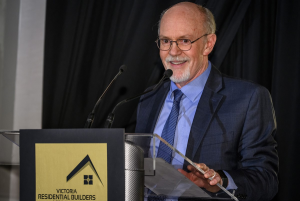
Casey Edge, VRBA Executive Director
BRITISH COLUMBIA – Canada is facing a crisis in governance that is adversely affecting the housing supply, a point Casey Edge, Executive Director of the Victoria Residential Builders Association, made clear as one of the panelists at a recent Macdonald-Laurier Institute luncheon in Victoria.
Edge pointed out that in 1976, Canada’s population was about 23 million, with housing starts of 273,000. In 2024, its population was 41 million, with starts of 245,000 a 50 percent decline in new housing. Or one housing start for every four people entering the working-age population, while the historical average is one new home for two people. To meet demand, Canada would have to double its housing construction capacity.
“Why are we unable to boost supply?,” Edge asked. “Government controls market housing. Three levels of government tell us where and what to build (zoning); when to build (permits); how to build (Building Code); and how much revenue they require (taxes, fees and amenities.)”

He explained that the BC government is primarily responsible for high housing costs by refusing to cap fees like Development Cost Charges, amenity contributions, annually ratcheting up building code regulations and costs, and undermining responsible regional planning for housing. When housing was more affordable and in greater supply, the market was less restricted.
Edge referred to a study by economist Evan Mast, who looked at a dozen cities and confirmed that the housing market is a migration ecosystem that works well when not disrupted by government fees and regulations. He explained that for every two market-rate homes, approximately one affordable home is created for those on lower incomes. A new high-end apartment building with 100 homes will result, on average, in 30 or 40 affordable homes.
“Simply building government subsidized housing will not solve the affordability problem,” Edge points out. “Mast points out the resources available are ‘nowhere near the scope of the challenge’. A case-in-point is the billions spent by provincial and federal governments without making a dent in housing affordability.”
Edge notes that B.C. governments of all stripes – the NDP, BC Liberals and Social Credit, have played a part in creating legislation that is affecting the current housing supply.
“The BC government created loopholes for municipalities large enough to drive a truck through the targets,” Edge notes. “The province enabled municipalities to boost fees like development cost charges and amenity demands to make projects unaffordable. They created a Site Standards manual for suitable setbacks, building heights, which municipalities ignore because the standards are not mandatory.”
In 2024, the City of Victoria boosted DCCs up to 258%. The CRD is proposing DCCs up to $9,045 per new home, to pay for a large water supply project. These increases ignore the BC govt’s DCC Best Practices Guide, which the province refuses to enforce.
“Some municipalities complain their workload is the reason for slow permits, except Langford had the largest workload for years and under Mayor Stew Young processed building permits in a few days,” he recalls. “The same permits take months in Saanich and other municipalities due to obstructive regulatory cultures.”
Failed governance policy of municipal self-determination has produced less housing, higher costs, poor planning and multiple building code standards.
Then there’s the BC Energy Step Code and Zero Carbon Step Code, which enables 180 BC municipalities to set their own energy efficiency levels as local politicians race to win the “greenest” label.
“It also opens the door to unintended consequences,” Edge observes. “Fast-tracking energy efficiency in the code led to toxic urea formaldehyde and asbestos insulation, costly leaky condo and now radon.”
Edge also casts his gaze at Renewable Natural Gas, such as is being produced by Capital Regional District residents in the form of waste/biogas from Hartland Landfill.
CRD’s elected representatives that supported the RNG project went back to their respective municipalities and banned the same RNG through the Zero Carbon Step Code enabled by the NDP government.
“That’s like asking FortisBC to buy their residents’ RNG, use FortisBC’s distribution system, then passing a bylaw preventing distribution of residents’ RNG,” he muses. “Only government can operate with this kind of bad faith and get away with it. They are off the rails.”
Edge believes local elected officials are completely out of sync with the public. A recent poll by the Angus Reid Institute says Canadians support expanding nuclear energy at 63%, followed by 61% for natural gas. Canadians want more energy, produced in Canada. They want to see economic growth and security prioritized.
However, the BC government and municipalities must recognize energy security and housing affordability require balance.
“Electricity provides only 16% of BC’s energy needs,” he says. “We can responsibly address climate change and secure our energy needs through LNG and RNG.”
In a recent article titled “Canada at a Crossroads – Volume 1: The housing crunch” published by the Macdonald Laurier Institute, the author, University of Guelph economics professor Ross McKitrick writes “Canada is beset by incompetent governance, runaway and rampant ideology, social malaise and a national identity crisis.”
Edge states there can be no other explanation for the energy and housing mess we are in. The solution?
“End the failed governance policy of municipal self-determination and create planning for housing, transportation and infrastructure. End the ongoing changes and costs to the building code,” he declares. “In short, end government obstruction and high construction costs, get out of the way, and let the market build with affordable energy.”
Business Examiner


